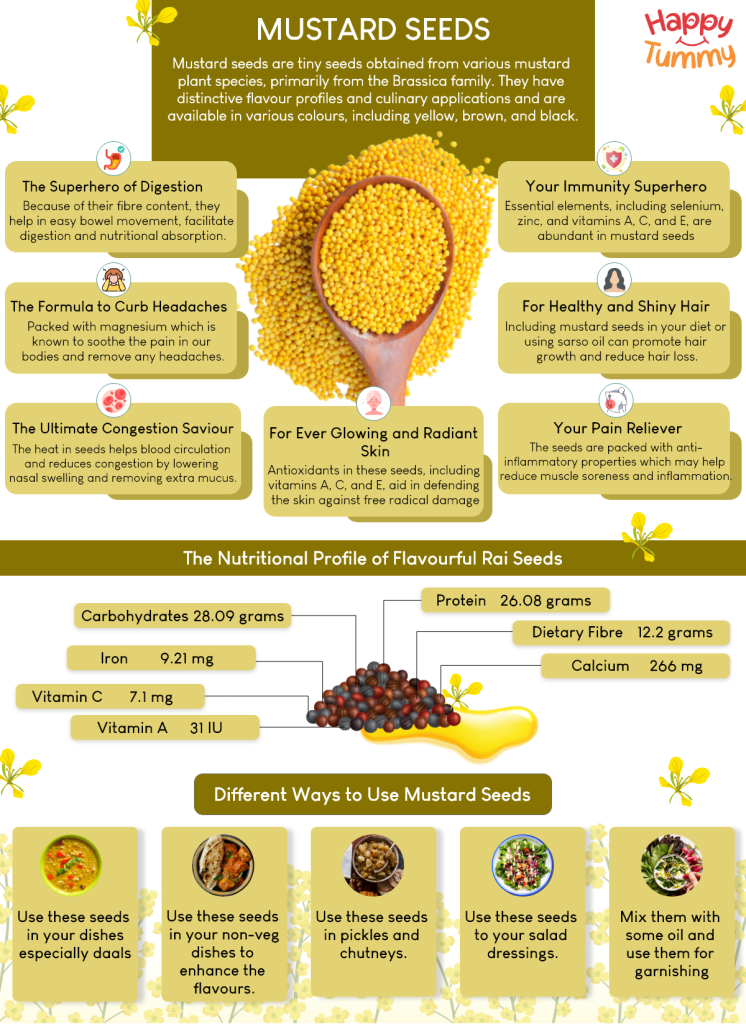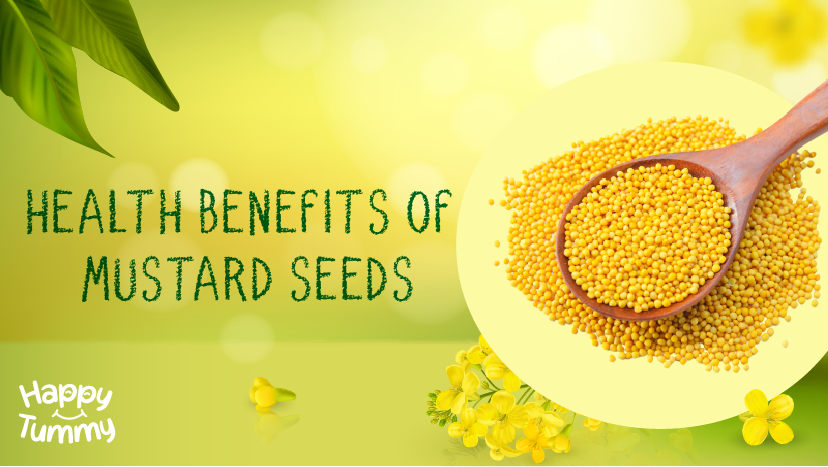Table of Contents
Can you solve this riddle – I am a tiny seed, not larger than a pinhead, but I hold a world of fantastic health benefits within me. Who am I?
If you haven’t figured out which tiny seed we are talking about, it is the mustard seeds that are commonly available in every Indian kitchen. Let’s welcome you to the world of this mighty mustard seed, where size doesn’t dictate its strength.
You might be surprised to learn that this unassuming seed, often relegated to a mere condiment, possesses remarkable properties that can transform your well-being.
Mustard or rai seed is an unsung hero of the culinary world and a secret powerhouse of nutrition. With its addition to the recipe, it not only enhances the flavour but also proves to be beneficial for our health.
So, let’s say goodbye to bland meals and hello to a kaleidoscope of flavours as we uncover the untapped potential of the mighty mustard seed.
Let’s Learn Everything about Mustard Seeds
Mustard seeds are tiny seeds obtained from various mustard plant species, primarily from the Brassica family.
They have distinctive flavour profiles and culinary applications and are available in various colours, including yellow, brown, and black. These seeds have been grown and utilized for ages in different global cuisines.
Mustard seeds are known for their robust and spicy flavour, intensifying when crushed or ground.
They are crucial ingredients in condiments like pickles, salad dressings, and mustard sauce. Also, mustard seeds are a spice used to season and heat cuisine.
The Nutritional Profile of Flavourful Mustard Seeds
If you are wondering why we are talking so much about a commonly used ingredient, it is time for you to check its nutritional value. In 100 grams of rai seeds, below are some of the essential nutrients available [1]:
| Nutrient | Value |
| Carbohydrates | 28.09 grams |
| Protein | 26.08 grams |
| Dietary Fibre | 12.2 grams |
| Vitamin A | 31 IU |
| Vitamin C | 7.1 mg |
| Calcium | 266 mg |
| Iron | 9.21 mg |
How Good is Mustard Seeds for Health – Let’s Find Out
You may determine the nutrient profile of this beautiful seed from the accompanying table. In addition to their culinary applications, mustard seeds provide several health advantages.
They are abundant in minerals like calcium, magnesium, potassium, and vital vitamins like A, B6, C, and E. Let’s look at their many health benefits.

#1 Mustard Seed – The Superhero of Digestion
With a fantastic percentage of dietary fibre available in these seeds, they become the superhero of your digestive system. Nothing is better than including these seeds in your diet if you have bowel or indigestion issues [2].
Because of their fibre content, they help in easy bowel movement, thus, enhancing the digestion power of your body and making your tummy happy tummy.
My Meal Plan
If you want to know how much fibre content is in the food you consume, try this My meal plan.
It is a beautiful platform designed by Aashirvaad Atta with Multigrain and tells about the fibre content in every food item you consume.
Digestive Quotient Test
Additionally, the glucosinolates in mustard seeds can increase the body’s synthesis of digesting enzymes. By breaking down the food, these enzymes facilitate digestion and nutritional absorption.
Do you know that Aashirvaad Atta with Multigrain has launched a Digestive Quotient Test to determine your overall digestive health? That is correct.
You can determine if your stomach is happy tummy by responding to a few straightforward questions about how well your digestive system is working.
#2. Mustard(Rai) Seeds – The Formula to Curb Headaches
Are you suffering from often headaches and wondering what you should do? The answer is simple – Include rai seeds in your diet. It is because these seeds are packed with magnesium which is known to soothe the pain in our bodies [3].
Moreover, you may have seen your mothers applying sarso ka tel on your head and giving you a massage in case of headaches.
Using mustard oil can promote relaxation and remove any headaches.
#3. Mustard Seeds – The Ultimate Congestion Saviour
Did you know in the 1900s, people made mustard plaster to relieve congestion, colds and flu [4]. These mustard plasters create a warm sensation on the skin and stimulate blood flow.
This process helps blood circulation and reduces congestion by lowering nasal swelling and removing extra mucus. All these were possible because of the heat present in the mustard seeds.
You can also make this mustard plaster at home in a simple way. To make a mustard seed plaster or poultice, you can follow these steps:
- Grind mustard seeds into a fine powder.
- Mix a tiny amount of flour or water with the powdered mustard seeds to create a paste-like consistency.
- Apply the paste on a clean piece of fabric or muslin.
- Place the cloth or material on the chest or back, covering the congested area.
Remember that mustard seed plasters are generally considered safe to relieve congestion temporarily.
However, you should see a doctor for an accurate diagnosis and effective treatment if your symptoms increase or worsen or you have underlying respiratory issues.
#4. Mustard Seeds – Your Immunity Superhero
Mustard seeds can support a robust immune system because of their nutrient profile and potential advantages.
Essential elements, including selenium, zinc, and vitamins A, C, and E, are abundant in mustard seeds [5].
These nutrients are crucial for sustaining immunological function because they support the immune system’s healthy operation and immune system integrity.
In addition, mustard seeds include a variety of antioxidants like phenolic compounds that can help protect cells from damage caused by risky free radicals.
The immune system may become compromised by chronic inflammation, rendering it more vulnerable to illnesses and infections.
Consuming mustard seeds modulate inflammation and support a balanced immune response. Besides, compounds present in mustard seeds, such as allyl isothiocyanate, have demonstrated antimicrobial properties.
They may help fight against certain bacteria, viruses, and fungi, thereby supporting the body’s defence against pathogens.
#5. Mustard(Rai) Seeds – For Ever Glowing and Radiant Skin
Rai seeds offer potential benefits for the skin due to their nutrient content and specific properties [6]. Antioxidants in these seeds, including vitamins A, C, and E, aid in defending the skin against free radical damage.
Free radicals can contribute to premature ageing, wrinkles, and skin damage. Antioxidants in mustard seeds help neutralize these free radicals, promoting a more youthful and healthier-looking complexion.
Also, mustard seeds have anti-inflammatory qualities that help calm and soothe sensitive skin.
These seeds can also be used as a natural exfoliator by being ground into a fine powder. Their slightly abrasive texture aids in the delicate removal of dead skin cells, opening clogged pores and promoting a clearer complexion.
Also, mustard seeds can naturally cleanse the skin by eliminating pollutants and surplus oil. Rai seeds also contain certain enzymes and compounds that can promote skin brightening and toning.
At the same time, sarso ka tel is rich in fatty acids and can serve as an effective moisturizer. It can help hydrate and nourish skin, making it supple, moisturized, and soft.
#6. Rai Seeds – For Healthy and Shiny Hair
Mustard seeds contain a compound called beta-carotene, which is converted into vitamin A in the body [7]. Including mustard seeds in your diet or using sarso oil can promote hair growth and reduce hair loss.
Additionally, the oil is renowned for its moisturizing qualities and can support hair nourishing. Applying this oil to your scalp regularly may enhance blood flow and supply vital nutrients to the hair follicles.
It also helps moisturize the scalp, preventing dryness and flakiness.
This oil can act as a natural conditioner, providing deep hydration to the hair strands.
Because Omega-3 fatty acids are present, it aids in making the hair supple, controllable, and silky.
These seeds have antifungal and antibacterial characteristics that can help treat scalp infections and dandruff. Using its oil or applying paste to the scalp may help reduce dandruff and alleviate scalp itchiness.
#7. Mustard Seeds – Your Pain Reliever
Mustard seeds can also be used to relieve painful muscles [8]. To ease discomfort, soak your feet in a tub of warm water with some powdered rai seeds.
These seeds have components of sinigrin and myrosinase that interact chemically with water to form allyl isothiocyanate.
This substance has been proven to possess pain-killing and anti-inflammatory properties, which may help reduce muscle soreness and inflammation.
Tips to Buy the Best Rai Seeds
You will find many varieties of rai seeds available in the market. Therefore, you should see the best one that offers the maximum health benefits. Try to look for organic rai seeds, which will be produced without harmful chemicals.
You can also check Aashirvaad Spices on an excellent quality mustard seed packet.
Steps for Keeping Your Mustard(Rai) Seeds Fresh for Long
Once you have purchased the best mustard seed, store them correctly. Before storing, make sure to check their expiration date and then follow the below steps:
- Ensure you are keeping the rai seeds in a cool place.
- Your rai seeds should be stored in an air-tight container.
- Before putting the seeds in the container, ensure it is completely dried.
- It should not be kept in a moist atmosphere.
- Always check the expiry before using it in cooking.
Different Ways to Use Rai Seeds
If you are looking for ways to incorporate these excellent seeds into your diet, check the following:
- Use these seeds for tempering your dishes, especially daals.
- You can use them in non-vegetarian dishes to enhance the flavours.
- Use these seeds in pickles and chutneys.
- Add some of these beautiful seeds to your salad dressings.
- If you use brown rai seeds, you can mix them with some oil and use them for garnishing. It can be used to garnish raita especially.
Just remember not to cook these seeds for too long, or else it may result in losing their taste and flavour. You can also go for its grounded powder if you do not have the seeds.
Let’s Rewind the Story of Mustard Seed
The magnificent mustard seed is a fantastic superfood that offers numerous health advantages. The rai seed is a powerhouse, from fighting inflammation to boosting the immune system.
Adding tiny seeds to your daily diet can help you prevent various health issues and enjoy a healthier lifestyle. So don’t miss out on the many benefits of this tiny yet mighty seed!
FAQs
Yes, rai seeds have a variety of health advantages. They provide a lot of fibre. Additionally, they are an excellent source of selenium, iron, zinc, and magnesium, vital nutrients for optimum health. Rai seeds also contain many antioxidants, which may slow ageing and offer protection from many ailments.
You can have mustard seeds every day, yes. They can be consumed raw or made into a powder and are a great source of vitamins, minerals, and antioxidants. Salads, soups, sauces, and other foods can all benefit from the flavour and nutrients of mustard seeds.
Rai seeds are perfect for hair. They are abundant in vital fatty acids, proteins, and minerals supporting healthy hair growth and strength. They also include natural oils that moisturize and nourish hair while assisting in protecting it from damage.
An edible seed of the mustard plant is known as the Indian mustard seed. It is indigenous to the Indian subcontinent and is utilized as a cooking spice worldwide. The tiny, rounded, golden seeds have a strong flavour. They can be used whole, crushed or ground into powder form.
Although there is no harm in eating these seeds raw, they will taste very bitter.















